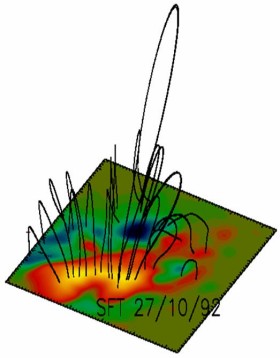
|
Science Highlight April 2006
|
 |

|
Science Highlight April 2006
|
 |
The solar magnetic field is an important quantity which couples the solar interior with the photosphere and corona. Unfortunately we cannot measure the coronal magnetic field directly, but we have to extrapolate it from photospheric measurements. In the past this has been achieved mainly by the assumption that the coronal magnetic field as a potential field which ignores the influence of electric currents. Photospheric vector magnetograph measurements, e.g., with the Solar Flare Telescope (SFT) in Tokyo show, however, that strong electric currents are present in the photosphere. We now take account of these currents in advanced models of the coronal magnetic field. The strong nonlinearity of the underlying mathematical model (nonlinear force-free magnetic fields) complicates this task. Additionally one has to consider that the solar photosphere and the corona are physically very different. In the photosphere the gas pressure of the plasma is about as strong as the magnetic pressure, but in the corona the magnetic pressure dominates and is approximately four orders of magnitudes larger than the gas pressure. The difference of the plasma parameters of photosphere and corona require a special preprocessing of the photospheric magnetic observations in order to serve as coronal boundary conditions. As a consequence of the magnetic field dominance in the corona, the electric currents must flow parallel or antiparallel to the magnetic field lines. These parallel electric currents are important for the structure and topology of the coronal magnetic field on all scales. A significant amount of energy, in particular in the vicinity of Active Regions, is stored in these currents.
 The figure shows nonlinear force-free coronal magnetic field lines above Active Region 7231. The photospheric magnetic field (colour coded: red positive, blue negative) and the photospheric electric currents have been measured with the solar flare telescope (SFT) in Tokyo. As a consequence of the localized electric currents the energy content of the Active Region is 30% higher than the corresponding current free configuration. This excess energy is assumed to be responsible for eruptive phenomena like flares and coronal mass ejections. The investigation of the energy release mechanism is subject of the future NASA-ESA mission
The figure shows nonlinear force-free coronal magnetic field lines above Active Region 7231. The photospheric magnetic field (colour coded: red positive, blue negative) and the photospheric electric currents have been measured with the solar flare telescope (SFT) in Tokyo. As a consequence of the localized electric currents the energy content of the Active Region is 30% higher than the corresponding current free configuration. This excess energy is assumed to be responsible for eruptive phenomena like flares and coronal mass ejections. The investigation of the energy release mechanism is subject of the future NASA-ESA mission ![]() STEREO.
STEREO.
T. Wiegelmann, B. Inhester, T.Sakurai
Preprocessing of vector magnetograph data for a nonlinear force-free magnetic field reconstruction
![]() Solar Physics, Vol. 233, 215-232, 2006
Solar Physics, Vol. 233, 215-232, 2006
| © 2009, Max Planck Institute for Solar System Research, Lindau |
Thomas Wiegelmann 27-03-2006 |